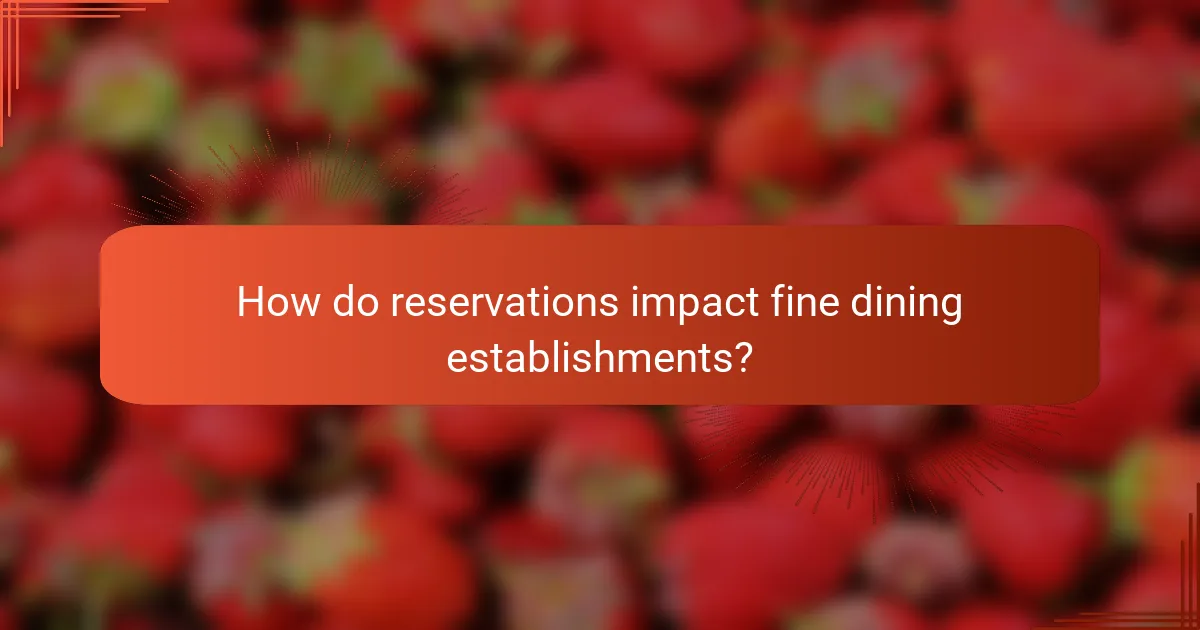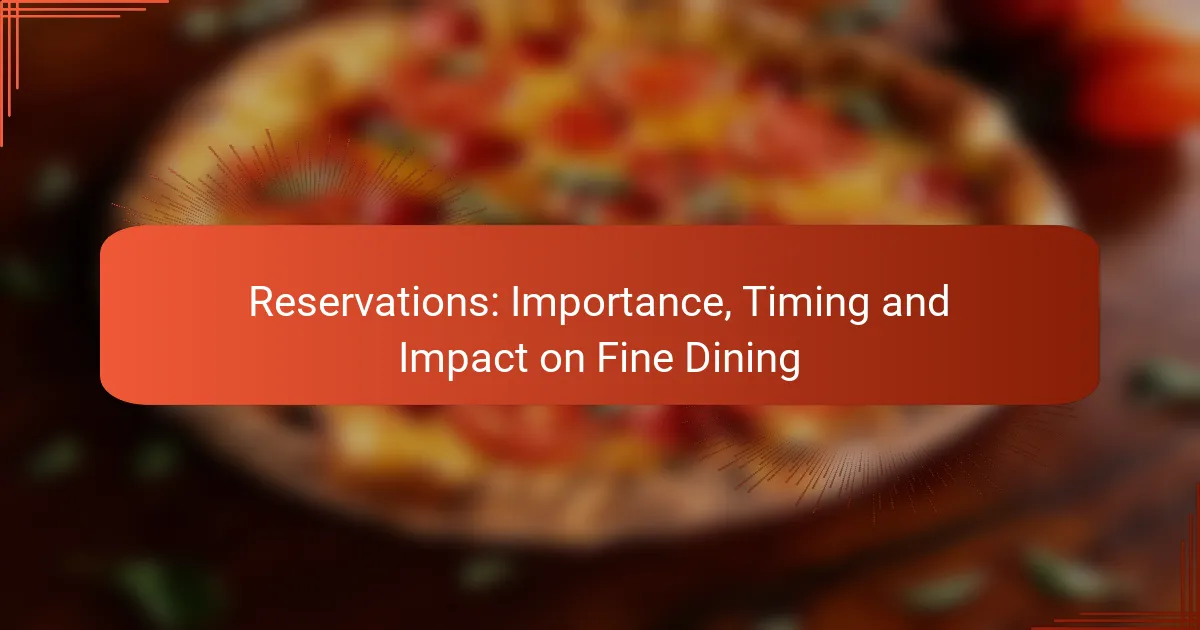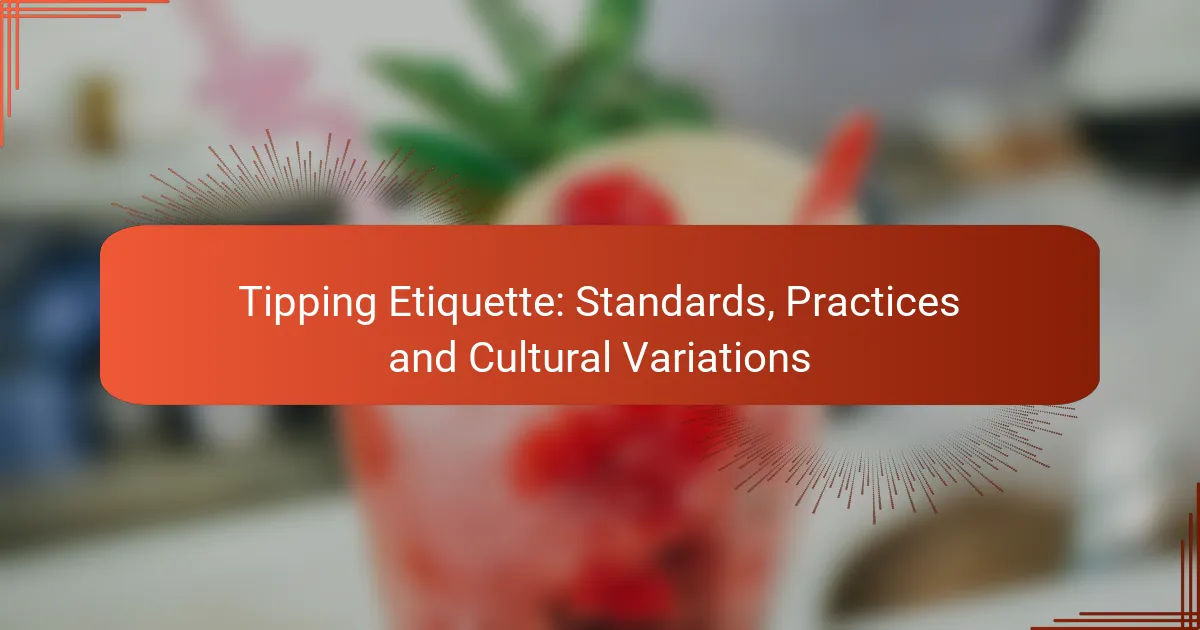Reservations are essential in fine dining, providing guests with guaranteed seating and allowing restaurants to manage capacity effectively. By booking in advance, especially during peak times, diners can ensure a smooth and enjoyable experience while helping establishments optimize service and revenue.

Why are reservations important in fine dining?
Reservations are crucial in fine dining as they guarantee a table for guests, ensuring a smooth and enjoyable dining experience. They help restaurants manage their capacity and resources effectively, enhancing overall service quality.
Ensures availability of desired dining experience
Making a reservation secures your spot at a restaurant, especially during peak dining hours or special occasions. This is particularly important in popular establishments where walk-in availability can be limited.
For instance, if you plan to dine at a Michelin-starred restaurant, booking weeks in advance is often necessary to ensure you can enjoy the experience on your preferred date.
Enhances customer satisfaction and service quality
Reservations allow restaurants to prepare for guests, leading to a more personalized and attentive service. When staff know how many diners to expect, they can allocate resources effectively, reducing wait times and improving the overall dining experience.
Additionally, having a reservation can lead to special accommodations, such as dietary preferences or celebrating special occasions, which enhances customer satisfaction.
Facilitates better restaurant management
Reservations provide restaurants with valuable data on customer preferences and peak times, allowing for better staffing and inventory management. This can lead to reduced food waste and improved operational efficiency.
Moreover, understanding reservation patterns helps restaurants plan promotional events or menu changes, aligning offerings with customer demand and maximizing profitability.

When should you make reservations for fine dining?
Making reservations for fine dining is essential, especially during busy periods. To ensure you secure a table, aim to book well in advance, particularly for peak times and special occasions.
Peak dining hours and weekends
Peak dining hours typically include Friday and Saturday evenings, when many people dine out. During these times, restaurants often experience high demand, making reservations crucial to avoid long waits or being turned away.
Consider making your reservation at least a week in advance for weekends. This allows you to choose your preferred time and seating, enhancing your dining experience.
Special occasions and holidays
Special occasions such as anniversaries, birthdays, and holidays like Valentine’s Day or New Year’s Eve significantly increase restaurant traffic. It is advisable to book these reservations several weeks in advance to secure a spot.
Many fine dining establishments offer special menus or events during holidays, so checking in advance can also help you plan for unique culinary experiences.
Advance booking recommendations
As a general rule, aim to make reservations at least two to four weeks ahead for popular fine dining venues. This timeframe increases your chances of getting a table at your desired time.
For last-minute plans, some restaurants may accept same-day reservations, but availability can be limited. Always call ahead to check if they can accommodate you, especially during busy periods.

How do reservations impact fine dining establishments?
Reservations play a crucial role in the operation of fine dining establishments by managing customer flow and optimizing overall efficiency. They help restaurants maximize revenue while ensuring a high-quality dining experience for guests.
Optimizes table turnover and revenue
By implementing a reservation system, fine dining restaurants can effectively manage table turnover, leading to increased revenue. Reservations allow establishments to predict busy periods and allocate resources accordingly, ensuring that tables are filled during peak hours.
For instance, a restaurant may set aside specific time slots for reservations, allowing them to serve more guests throughout the evening. This approach can lead to a significant boost in overall sales, particularly during weekends or holidays when demand is high.
Influences menu planning and staffing
Reservations provide valuable insights into expected customer volume, which directly influences menu planning and staffing decisions. Knowing the number of guests in advance allows chefs to prepare ingredients and dishes more efficiently, minimizing waste and ensuring freshness.
Additionally, restaurants can schedule staff based on reservation data, ensuring that there are enough servers and kitchen staff available during busy times. This strategic staffing helps maintain service quality, which is essential in the fine dining sector.
Affects customer loyalty and retention
Having a reservation system can enhance customer loyalty by providing a seamless dining experience. When guests can easily secure a table, they are more likely to return, knowing they won’t face long wait times or disappointment.
Moreover, restaurants can personalize the dining experience by tracking customer preferences through reservations. This attention to detail fosters a sense of connection and encourages repeat visits, ultimately benefiting the establishment’s reputation and profitability.

What criteria should you consider when choosing a fine dining restaurant?
When selecting a fine dining restaurant, consider factors such as the establishment’s reputation, menu options, and the overall ambiance. These elements significantly influence your dining experience and satisfaction.
Restaurant reputation and reviews
The reputation of a fine dining restaurant can often be gauged through online reviews and ratings. Look for establishments with consistently high ratings on platforms like Yelp or TripAdvisor, as well as recognition from culinary awards or local food critics.
Pay attention to specific comments regarding service quality, food presentation, and overall dining experience. A restaurant with a strong reputation is more likely to deliver a memorable meal.
Menu offerings and dietary accommodations
Examine the menu offerings to ensure they align with your culinary preferences and dietary needs. Many fine dining restaurants provide a range of options, including vegetarian, vegan, and gluten-free dishes.
It’s advisable to check if the restaurant can accommodate special requests or allergies. A well-rounded menu with flexible options can enhance your dining experience significantly.
Location and ambiance
The location of a fine dining restaurant can impact both convenience and the dining atmosphere. Consider whether you prefer a bustling city center or a quieter, scenic area.
Ambiance plays a crucial role in fine dining; look for restaurants that offer a comfortable and elegant setting. Factors such as lighting, decor, and noise levels can greatly affect your enjoyment of the meal.

What are the trends in fine dining reservations?
Trends in fine dining reservations are increasingly shaped by technology and consumer preferences. Key developments include the rise of online platforms, mobile app integration, and dynamic pricing strategies that enhance the dining experience while optimizing restaurant operations.
Online reservation platforms like OpenTable
Online reservation platforms such as OpenTable have revolutionized how diners secure tables at fine dining establishments. These platforms allow users to browse available restaurants, view menus, and make reservations with just a few clicks, streamlining the booking process.
Restaurants benefit from increased visibility and the ability to manage their seating efficiently. Many establishments now rely on these platforms to fill tables during peak hours, reducing no-shows and maximizing revenue.
Mobile app integration for convenience
Mobile app integration has made making reservations even more convenient for diners. Many restaurants now offer their own apps or partner with existing platforms, allowing users to book tables directly from their smartphones.
This trend caters to the on-the-go lifestyle of many consumers, enabling them to secure reservations quickly and receive real-time updates about their bookings. Additionally, features like reminders and waitlist notifications enhance the overall dining experience.
Dynamic pricing strategies
Dynamic pricing strategies are becoming more common in fine dining, where prices may fluctuate based on demand, time of day, or special events. This approach allows restaurants to optimize their pricing and manage customer flow effectively.
For diners, this means that prices may vary significantly, so it’s wise to check for the best times to dine. Restaurants employing this strategy can offer lower prices during off-peak hours, encouraging more patrons to visit during quieter times.

How can you maximize your fine dining reservation experience?
To maximize your fine dining reservation experience, plan ahead and communicate effectively with the restaurant. This includes making reservations early, especially for popular venues, and clearly stating any special requests or dietary restrictions.
Communicate special requests in advance
When making a reservation, it’s crucial to inform the restaurant of any special requests, such as dietary restrictions or celebrations. This allows the staff to prepare accordingly and enhance your dining experience.
For example, if you’re celebrating a birthday, let the restaurant know so they can arrange a special dessert or a personalized greeting. Similarly, if you have allergies or specific dietary needs, communicate these at least a few days before your visit to ensure they can accommodate you.
Don’t hesitate to follow up with the restaurant a day or two before your reservation to confirm that your requests have been noted. This proactive approach can help prevent any last-minute surprises and ensure a smoother dining experience.



